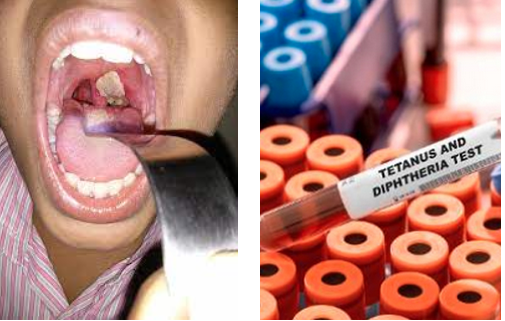

By Adebukola Aluko
Few months ago, there was a new outbreak of diphtheria across the Northern part of the country in states such as Kano, Kaduna, Jigawa and Yobe.
It is worrisome that at least 10 people died following the outbreak of 91 suspected cases across 14 local government areas in Jigawa State.
Similarly, on the 23rd of June this year, the Kaduna state government confirmed that the death toll from diphtheria outbreak in the state has risen to 17 with 68 suspected cases.
In Potiskum Local Government Area of Yobe State, at least seven children died and 22 others also hospitalised at the Specialist Hospital in Potiskum.
The deadly outbreak of the infection had also seen 61 lives lost as of March 2, 2023 in Kano.
As cases reportedly spike, it is however important to know what diphtheria is, the possible treatment and causes.
What is Diphtheria?
Diphtheria is a contagious infection caused by a bacterium called Corynebacterium diphtheriae. The bacterium releases a toxin that causes a buildup of grey tissue in the throat.
The bacterial infection affects the throat and upper airways, causing difficulty in breathing, heart failure, and even death. The disease is highly contagious and spreads easily through coughing and sneezing.
It is, however, a vaccine preventable infection.
How is diphtheria Contracted?
Diphtheria can be contracted through airborne droplets that contain bacteria (spread by sneezing, coughing and spitting) or by touching something that has bacteria on it. It is also possible that an infected person could transmit the disease through an open sore touched by someone else, or touching clothes that someone else touches. It’s possible to get diphtheria more than once.
It is not only highly contagious disease but also easily spreads through airborne droplets.
Anyone who isn’t protected by the vaccine, and comes in close contact with an infected person, can develop diphtheria.
Common diphtheria symptoms include:
Throat pain.
Weakness or fatigue.
Fever.
Swollen neck glands.
Problems breathing due to tissues obstructing the nose and throat.
Difficulty swallowing (dysphagia).
Nerve, kidney or heart problems (if the bacteria enters your bloodstream).
Headache, Cough and Difficulty in Breathing.
An infected person typically shows signs of diphtheria around 2-5 days after exposure. The length of time for symptoms to show can be anywhere from 1-10 days after exposure.
Prevention
There are different immunization schedules for getting the series of shots, including booster shots after the first ones are given.
According to the Program Manager, State Emergency Routine Immunization Coordination Centre, (SERICC) Dr Adewole Adeyemi, Nigerian Routine Immunization Schedule has a Pentavalent which contains Diphtheria as a component of the five antigens in the vaccines which is given to children at 4weeks interval from age 6-10weeks.
Complete dose of the vaccine will prevent the infection.
It is of note that all vaccine preventable diseases are not reactive to drugs, it is only the symptoms that could be treated.
In general, the vaccine side effects may include fever, pain or redness at the needle site, and rarely, an allergic reaction to the vaccine itself.
In order to curb the scourge of this virus, there is the need to sensitize people at the grassroot on the need to ensure proper cleanliness of their environment.
The Nigeria Centre for Disease Control and Prevention must be alive to its responsibility and adopt measure to prevent the spread of the disease.
As the death toll continues to rise, it is imperative that swift action is taken to curb the spread of this deadly disease. The government must prioritize vaccination efforts to protect the health and well-being of its citizens.
Treatment
Treatment for diphtheria can be effective, But, even with treatment, roughly 1 out of 10 people might die.
For those without treatment, one out of two patients may die. Vaccination is the best choice. If you haven’t been vaccinated, make an appointment with your healthcare provider.
For people with diphtheria, it usually takes about two to three weeks for treatment to be effective. Any skin ulcers could take two or three months to fully heal, though scarring may be permanent.
When treated immediately, diphtheria is managed successfully with antitoxins and antibiotics. Vaccination can prevent diphtheria altogether.
Additional information from
Program Manager, State Emergency Routine Immunization Coordination Centre (SERICC) Dr Adewole Adeyemi.
https://www.medicinenet.com/diphtheria_facts/article.htm
Subscribe to our Telegram and YouTube Channels also join our Whatsapp Update Group